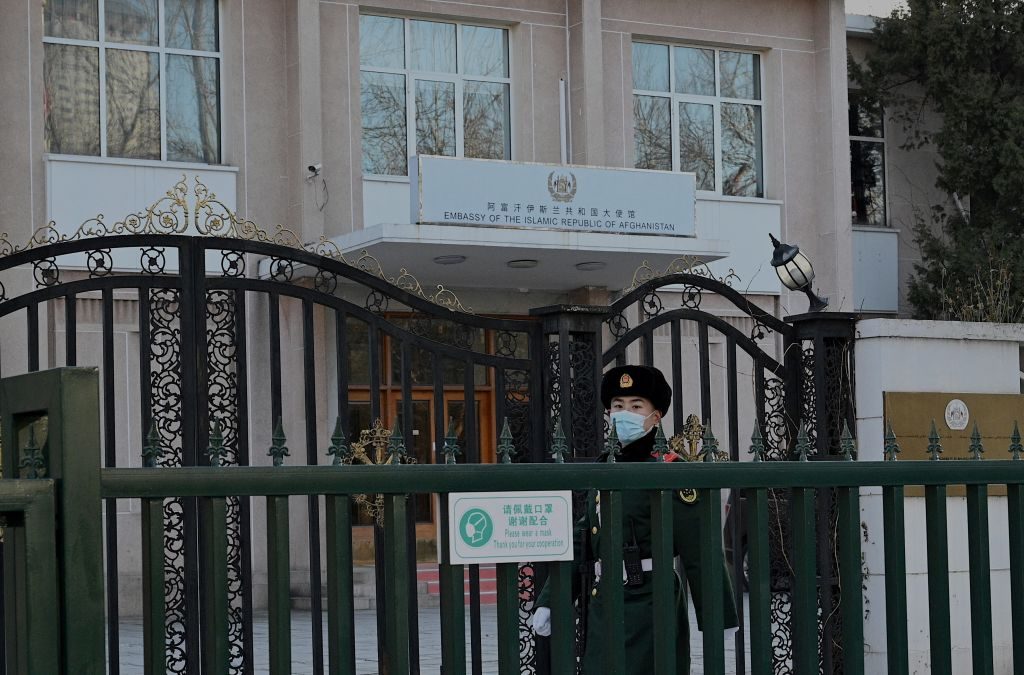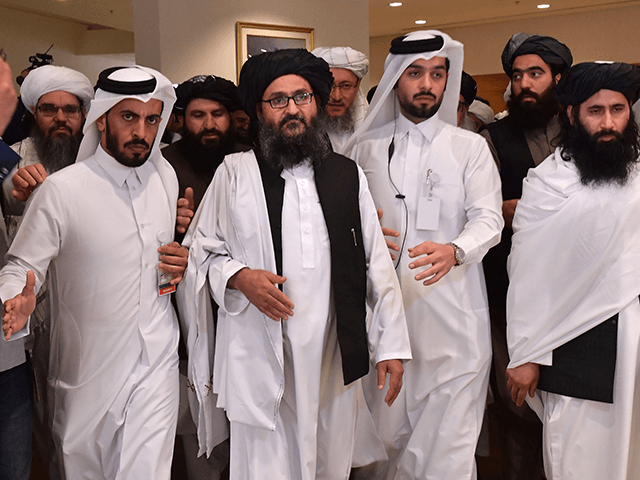Chinese dictator Xi Jinping praised the “sovereignty, independence and territorial integrity” of Afghanistan in a message to a foreign ministers’ meeting featuring a Taliban representative on Thursday, encouraging neighboring countries to “do their best” to support the “Afghan people.”
China is currently hosting a two-day summit in Anhui province of regional leaders to discuss the future of Afghanistan. Taliban “Foreign Minister” Mawlawi Amir Khan Muttaqi arrived on Wednesday and is participating in conversations with China and other top diplomats.
No state actor has yet recognized the Taliban jihadist organization as the formal government of Afghanistan, but China has referred to the group as an “interim” or “caretaker” government and encouraged cooperation with it on alleged humanitarian grounds. Chinese officials have encouraged business leaders to invest in Afghanistan and America, specifically, to fund the success of the Taliban.
چین کې د افغانستان په اړه د سیمي د بهرنیو چارو وزیرانو غونډه پیل شوه. pic.twitter.com/rP6xoK2Hte
— Bilal Karimi(بلال کریمي) (@BilalKarimi21) March 31, 2022
In addition to the Taliban, China invited the top diplomats of Pakistan, Iran, Russia, Tajikistan, Turkmenistan, Uzbekistan, Indonesia, and Qatar – not a neighbor, but host to the Taliban’s “political office” for much of the 20-year Afghan war – to the summit. America notably does not have representation at the meeting.
“Chinese President Xi Jinping on Thursday called on the neighboring countries of Afghanistan to do their best to support the Afghan people to create a brighter future,” the state-run Xinhua News Agency reported on Thursday. “Xi pointed out that having gone through so much in the past, Afghanistan is in urgent need of development in many areas. The country has come to a critical point of transition from chaos to order.”
The outlet quoted Xi as praising Afghanistan under the Taliban as a “common neighbor and partner … and we form a community with a shared future linked by the same mountains and rivers who would rise and fall together.” Afghanistan borders occupied East Turkistan, where China is currently committing genocide against members of Muslim ethnic minority groups.
While the Taliban is a Sunni jihadist organization, it has expressed no concern regarding the genocide of Muslims across its border. Conversely, China has not pressured the Taliban regarding its open ties to al-Qaeda and other global terrorist groups, its prominent role in international drug trafficking, or its flagrant human rights abuses, particularly against women.
“China always respects Afghanistan’s sovereignty, independence and territorial integrity, and has committed to supporting its pursuit of peace, stability and development,” Xi’s message read.
Xi did not attend the summit, but sent a written message to the foreign ministers, according to Xinhua. Xi was busy this week planting trees in Beijing. Tunxi, the Anhui province area hosting the Afghanistan summit, is about two hours from Beijing by plane.
Chinese President Xi Jinping on Wednesday planted trees in Beijing in the 10th year of his participation in the annual tree-planting activity as the top leader, demonstrating how much he values efforts to make the country's land greener https://t.co/0WdhQobqrZ pic.twitter.com/TzipJUe5xH
— China Xinhua News (@XHNews) March 31, 2022
Xi’s remarks did not name the Taliban in any way, sticking to the Communist Party’s typical use of the term “Afghan people” when discussing sending funding and other aid to Afghanistan that would inevitably fall into Taliban hands. Xi also did not acknowledge, according to the reports in state media, the presence of the Taliban’s “foreign minister” at the meeting.
Muttaqi, the foreign minister, held talks with Chinese counterpart Wang Yi and Pakistan’s envoy to the summit on Wednesday. The Taliban’s press agency published photos and videos of Muttaqi landing in Anhui to warm greetings from Chinese officials. The meeting, Taliban deputy spokesman Bilal Karimi announced, focused heavily on “economic cooperation.” Muttaqi specifically noted that the Taliban is interested in joining China’s Belt and Road Initiative (BRI), a global infrastructure plan in which China offers impoverished countries predatory loans it later uses to seize strategically significant territory.
“Afghanistan supports China’s major Belt and Road Initiative and is keen to see Afghanistan play a useful role in regional integration through this project,” Muttaqi reportedly said.
۱ــ د افغانستان، پاکستان او چین د بهرنیو چارو وزیرانو په افغانستان کې له تحول وروسته په لومړي ځل درې اړخیز میکانیزم بیا ژوندی کړ.
په نننۍ درې اړخیزه ناسته کې چي په چین کې تر سره شوه د چین د بهرنیو چارو وزیر ښاغلي وانګ يي وویل، لېواله دی چې درې اړخیزه ناسته بیا ژوندۍ شي او pic.twitter.com/BjXR89qP9E
— Bilal Karimi(بلال کریمي) (@BilalKarimi21) March 30, 2022
China’s Global Times government propaganda newspaper emphasized the major role Afghanistan under the Taliban could play in the BRI on Thursday.
“Under the current circumstances, China, Afghanistan and Pakistan should restart the tripartite cooperation mechanism and advance cooperation in the three areas of politics, development and security,” the Global Times paraphrased Wang as proposing, “based on the principles of mutual respect, equal consultation and mutual benefit.”
“We will jointly build the Belt and Road Initiative, extend the China-Pakistan Economic Corridor to Afghanistan, and help Afghanistan participate in regional connectivity, he noted,” it added.
Given that the remarks were made at a meeting with an official Taliban representative, China is de facto treating Afghanistan as synonymous with the Taliban despite not formally recognizing the Taliban as the Afghan government.
Elsewhere in its online pages, the Global Times took the time to condemn the United States for Afghanistan’s current humanitarian crisis, the result of 20 years of war greatly exacerbated by Taliban atrocities.
“The world should not forget about Afghanistan, and the US, as the culprit of the Afghan problem, should not deliberately ignore and avoid the country,” the outlet proclaimed in an editorial. “Of course, we can’t expect too much from the US, a country that has divided $7 billion of life-saving money which belongs to the Afghan people in the face of an ‘avalanche of hunger and poverty.'”

File/The Afghanistan embassy in Beijing on January 10, 2022 where Afghanistan’s envoy to China announced his resignation on social media via colorful handover note, detailing how diplomats had not been paid for six months following the Taliban takeover. (NOEL CELIS/AFP via Getty)
The Times claimed America has “a greater responsibility to alleviate the humanitarian crisis in Afghanistan and to participate in the reconstruction activities in this country.”
The Taliban ruled Afghanistan with an iron fist for much of the 1990s, losing power when America invaded following the attacks on September 11, 2001. The Taliban’s direct ties with al-Qaeda, the group responsible for the attacks – which continue to this day through its relationship with the notorious Haqqani network – led President George W. Bush to launch a campaign to remove the Taliban.
The Taliban returned to power in August 2021 after President Joe Biden announced he would break a deal brokered by predecessor Donald Trump and extend the war from May to September of that year. By August, Biden had abruptly agreed to withdraw all troops, prompting the Taliban to enter Kabul and resulting in the flight of former President Ashraf Ghani from the country.

COMMENTS
Please let us know if you're having issues with commenting.